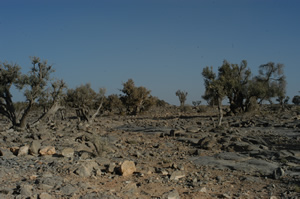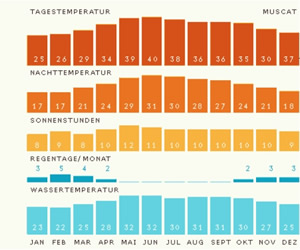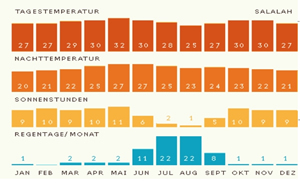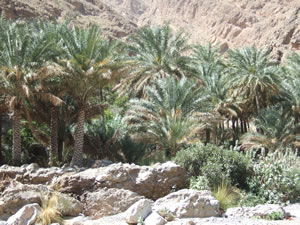The climate of Oman has two basic specifications: desert climate and subtropical climate. In most parts of the country it is extremely hot and dry throughout the year. Four climatic regions can be distinguished.
The northern coast
In this area, the climate is subtropical with warm winters (22-25°C)
and hot summers (36-39°C and peak values of 45°C). There is no
great variation between day and night temperatures, so that summer night
temperatures are rarely below 30 °C. Humidity is throughout the whole
year very high (60-80%), but the annual precipitation is only about 100
mm (10-20 days with rain). Most rain falls in form of downpours between
December and March with high flooding risk.
The Al-Hajar Mountains
In this area the winters are cool and the night temperature can drop below
0°C in January and February, sometimes with snow. Precipitation can
be up to several hundred mm. In summer there is no precipitation and day
temperatures can climb up to 30°C. The nights can be very chilly though.
The inner Oman
This area has a typical desert climate with cool to warm winters and extremely
hot summers. The rare rainfalls occur during winter. The day temperatures
in the summer can be as high as 52°C with mean values of 41-44°C.
In spite of considerable day-night fluctuations, the night temperatures
drop rarely below 25°C. Humidity is very low throughout the year with
summer values of about 20 %.
The South/ Dhofar
In this region the air is warm and humid during the whole year. The winter
temperatures are about 27-28°C during the day and 20-22°C at night.
In this period there is only little rainfall and humidity is about 50-60
%. The early summer is the hottest period with day temperatures of 31-33°C
and similar night temperatures. In July, August and September the monsoon
brings about 22 days with rain each month. There are no day-night fluctuations
during this period.
To read more about Oman's climate, please download the essay "Introduction to Oman" by Felix Richter.
Continue to "Flora and Fauna".



